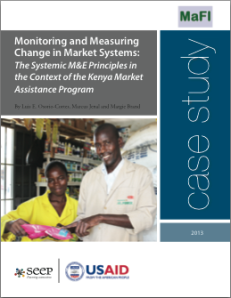As external development agents, we cannot create impacts with all the qualities we want them to have: sustainable, inclusive, gender-equal, etc. We can only work with and through the system, so these qualities become an inherent part of how the system does things. Let’s say we call a system ‘healthy’ when it is creating these qualities we would like to see (although I’m not sure ‘healthy’ is the best term, it sounds a bit judgemental, but it has been used by others before). The question is how does a healthy system look like that is more likely to deliver impacts with the desired qualities? And how can we improve the health of a system?
There are various bodies of knowledge, all rooted in systems and complexity thinking, that give us some ideas to help answer this question. They all answer them from a different perspective and some are clearly limited in scope while others claim universality. I want to introduce three sets of principles or maybe sets of favourable behaviours here. Continue reading

 The SEEP Network published a new paper, which I have co-authored together with Lucho Osorio and Margie Brand. The publication is part of SEEP’s Systemic M&E Initiative.
The SEEP Network published a new paper, which I have co-authored together with Lucho Osorio and Margie Brand. The publication is part of SEEP’s Systemic M&E Initiative.